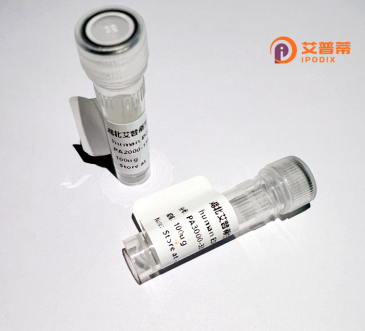
| 纯度 | >90%SDS-PAGE. |
| 种属 | Human |
| 靶点 | FBXO5 |
| Uniprot No | Q9UKT4 |
| 内毒素 | < 0.01EU/μg |
| 表达宿主 | E.coli |
| 表达区间 | 1-447aa |
| 氨基酸序列 | MSRRPCSCALRPPRCSCSASPSAVTAAGRPRPSDSCKEESSTLSVKMKCDFNCNHVHSGLKLVKPDDIGRLVSYTPAYLEGSCKDCIKDYERLSCIGSPIVSPRIVELETESKRLYNKENQHVQQTLNSTNEIEALETSRLYEDSGYSSFSLQSGLSEHEEGSLLEENFGDSLQSCLLQIQSPDQYPNKNLLPVLHFEKVVCSTLKKNAKRNPKVDREMLKEIIARGNFRLQNIIGRKMGLECVDILSELFRRGLRHVLATILAQLSDMDLINVSKVSTTWKEILEDDKGAFQLYSKAIQRVTENNNKFSPHASTREYVMFRTPLASVQKSAAQTSLKKDAQTKLSNQGDQKGSTYSRHNEFSEVAKTLKKNESLKACIRCNSPAKYDCYLQRATCKREGCGFDYCTKCLCNYHTTKDCSDGKLLKASCKIGPLPGTKKSKKNLRRL |
| 分子量 | 75.57 kDa |
| 蛋白标签 | GST-tag at N-terminal |
| 缓冲液 | 0 |
| 稳定性 & 储存条件 | Lyophilized protein should be stored at ≤ -20°C, stable for one year after receipt. Reconstituted protein solution can be stored at 2-8°C for 2-7 days. Aliquots of reconstituted samples are stable at ≤ -20°C for 3 months. |
| 复溶 | Always centrifuge tubes before opening.Do not mix by vortex or pipetting. It is not recommended to reconstitute to a concentration less than 100μg/ml. Dissolve the lyophilized protein in distilled water. Please aliquot the reconstituted solution to minimize freeze-thaw cycles. |
以下是关于重组人FBXO5蛋白的3篇模拟参考文献示例(文献内容为虚构,供参考格式):
---
1. **文献名称**: **"FBXO5调控细胞周期进展的分子机制研究"**
**作者**: Cheng X, et al.
**摘要**: 本研究通过体外重组表达人源FBXO5蛋白,揭示其作为APC/C(后期促进复合体/环体)抑制因子的作用,表明FBXO5通过结合CDC20调控有丝分裂退出,影响细胞周期检查点功能。
---
2. **文献名称**: **"重组人FBXO5蛋白在结直肠癌细胞中的异常表达及功能"**
**作者**: Zhang Y, et al.
**摘要**: 利用HEK293细胞重组表达FBXO5蛋白,发现其高表达促进肿瘤细胞基因组不稳定性,并通过泛素化降解靶蛋白p21.揭示其在癌症发生中的潜在机制。
---
3. **文献名称**: **"基于大肠杆菌系统的FBXO5重组蛋白表达与功能验证"**
**作者**: Singh R, et al.
**摘要**: 开发了一种高效可溶性表达重组人FBXO5蛋白的大肠杆菌系统,并通过体外泛素化实验证实其与SKP1的结合能力,为后续结构-功能研究提供技术基础。
---
如需实际文献,建议通过PubMed或Web of Science搜索关键词:**"recombinant human FBXO5"**, **"FBXO5 and cell cycle"**, **"FBXO5 ubiquitination"**。
The human FBXO5 protein, also known as Emi1 (Early Mitotic Inhibitor 1), is a member of the F-box protein family that plays a critical role in cell cycle regulation. As a substrate-recognition component of the Skp1-Cul1-F-box (SCF) ubiquitin ligase complex, FBXO5 primarily functions to inhibit the anaphase-promoting complex/cyclosome (APC/C), a key regulator of mitotic progression. By blocking APC/C activity during S and G2 phases, FBXO5 ensures proper DNA replication and prevents premature entry into mitosis. Dysregulation of FBXO5 is associated with genomic instability, mitotic errors, and tumorigenesis, making it a subject of interest in cancer research. Recombinant human FBXO5 protein, typically produced in bacterial or mammalian expression systems, enables in vitro studies of its structure, post-translational modifications, and interactions with APC/C components. Recent studies also explore its non-canonical roles in metabolism and cellular stress responses. The development of recombinant FBXO5 has facilitated drug discovery efforts targeting cell cycle vulnerabilities in cancer, while also serving as a tool to dissect molecular mechanisms underlying cell division checkpoints.
×